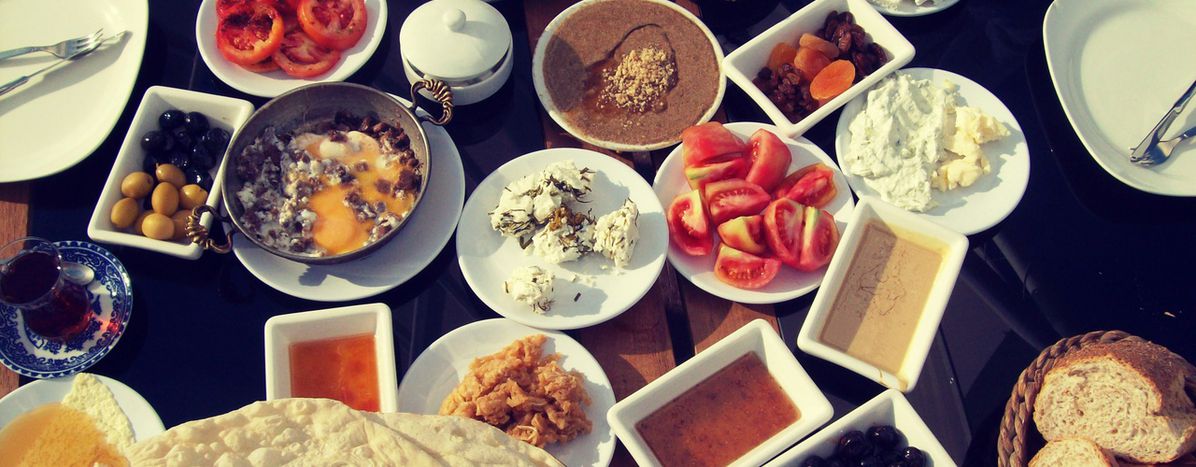
How to Survive as a Vegetarian in Turkey
Published on
During my Erasmus semester in Istanbul, I grew to love Turkish cuisine. Turkey has a reputation of being a meat-loving country – and it is! – but many people don’t know that it can be a great place for vegetarians too. My experience as a vegetarian in Istanbul have led me to discover some spectacular meat-free Turkish foods.
Contrary to what most of the locals say, Turkey is an awesome country for vegetarians. Many of the ‘fast-food’ options that are offered in street-stalls are vegetarian, or even vegan, already. Think of mısır (grilled corn), kestane (roasted chestnuts), simit (circular bread with sesame seeds), pilav (rice, often served with chickpeas), tulumba (a fried batter soaked in syrup, similar to churros), popcorn, as well as a wide array of fruits and juices.
Even though they are sold on literally every street corner, there is a lot more to Turkish cuisine than the döner kebap. In Istanbul alone there are over 85 veggie-friendly restaurants and out of these, 32 serve strictly vegan or vegetarian food (check out HappyCow.net to find out more).
Learn the lingo
However, even though there are plenty of meat-free dishes in Turkey, the concept of vegetarianism isn’t always completely understood. In Istanbul and more touristy towns it is very likely that people will understand what vegetarianism involves - even though it is still very hard to comprehend why one would decide to adopt such eating habits.
When visiting areas outside the capital, it might be wise to clarify what you can and what you can’t eat. If the menu is in English, the restaurant is likely to be aimed at international visitors and will usually have at least one vegetarian option. If the menu is in Turkish it might be less easy to figure out what is available.
Usually I can just ask the waiter which options on the menu are vegetarian, thus far this has worked out fine for me. However, what if you come across a place in which none of the staff members speak a word of English? Even in Istanbul this happens a lot more than you would think. Therefore, it proved useful to learn some basic vegetarianism-survival phrases:
Bu yemeğin içinde et var mı? - Is there meat in this dish?
Etsiz? - Without meat?
Etsiz yemek var mı? - Do you have any dishes without meat?
Ben vejetaryenim. - I am a vegetarian.
A Turkish vegetarian's best friends
In any restaurant or büfe, I manage to find a vegetarian friendly options. Turkish cuisine contains a lot of veggies. A plate of rice with a side of vegetables is always a safe (and also healthy!) choice. Aside from that, the following foods are among my favorites:
Çig köfte
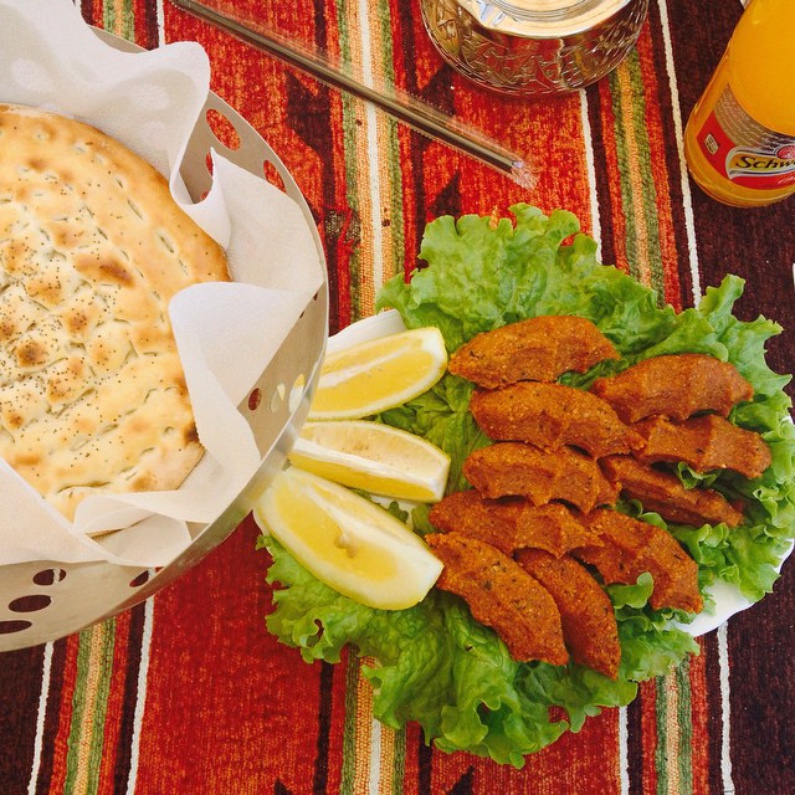 Çig köfte is to be found on almost every street corner. Çiğ means 'raw' and köfte means 'meatball', and indeed, çiğ köfte was traditionally made with raw meat. By now, beef or lamb has been replaced by vegetarian ingredients (the main ingredient usually being bulgur). It is healthy, spicy and super cheap.
Çig köfte is to be found on almost every street corner. Çiğ means 'raw' and köfte means 'meatball', and indeed, çiğ köfte was traditionally made with raw meat. By now, beef or lamb has been replaced by vegetarian ingredients (the main ingredient usually being bulgur). It is healthy, spicy and super cheap.
Menemen
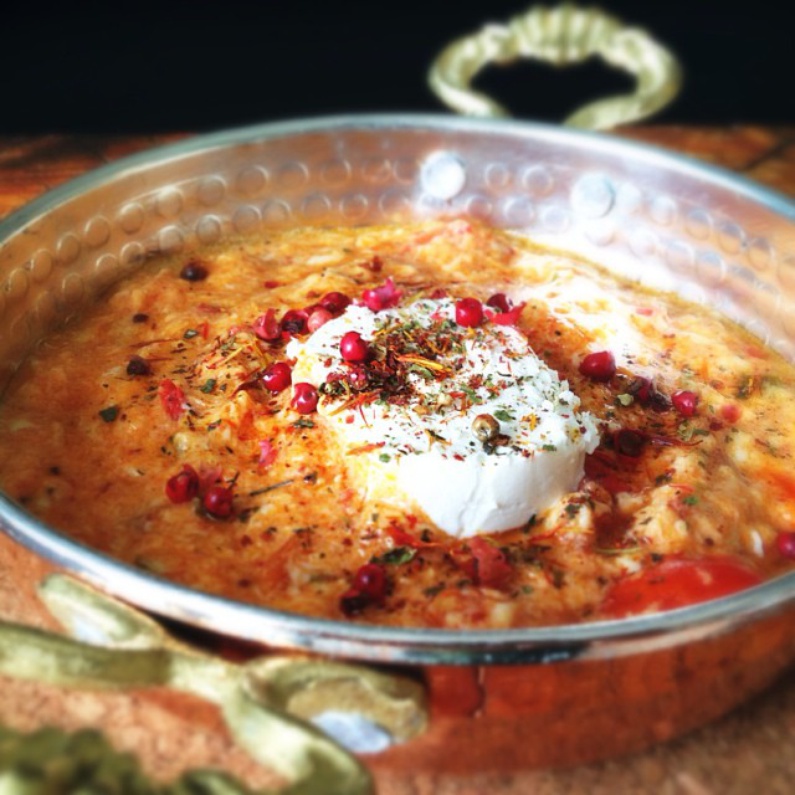 Menemen is a traditional Turkish dish which includes eggs, onion, tomato, green peppers, spices and, if you don't mind a non-vegan addition, cheese. Menemen is commonly eaten for breakfast and served with bread, that you can dip inside.
Menemen is a traditional Turkish dish which includes eggs, onion, tomato, green peppers, spices and, if you don't mind a non-vegan addition, cheese. Menemen is commonly eaten for breakfast and served with bread, that you can dip inside.
Börek
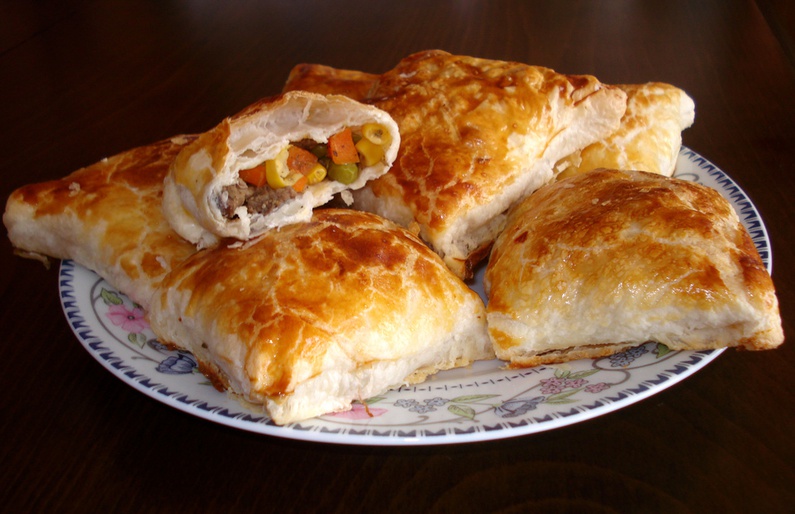 Börek is a filled pastry usually eaten for breakfast, lunch or packed and eaten cold as a snack while on the road. Most common fillings are potatoes, cheese and spinach.
Börek is a filled pastry usually eaten for breakfast, lunch or packed and eaten cold as a snack while on the road. Most common fillings are potatoes, cheese and spinach.
Dolma
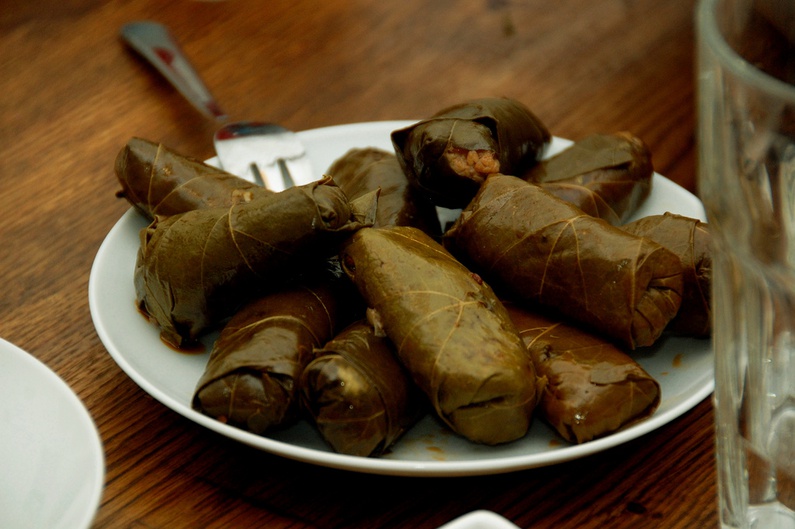 Dolma is a stuffed vegetable, most commonly vineleaves with rice, but can also include tomato, pepper, onion, courgette, aubergine and garlic. The stuffing may or may not include meat, so pay attention to that (cold served dolma is usually without meat, versus hot dolma which is habitually served with minced meat).
Dolma is a stuffed vegetable, most commonly vineleaves with rice, but can also include tomato, pepper, onion, courgette, aubergine and garlic. The stuffing may or may not include meat, so pay attention to that (cold served dolma is usually without meat, versus hot dolma which is habitually served with minced meat).
Çorba
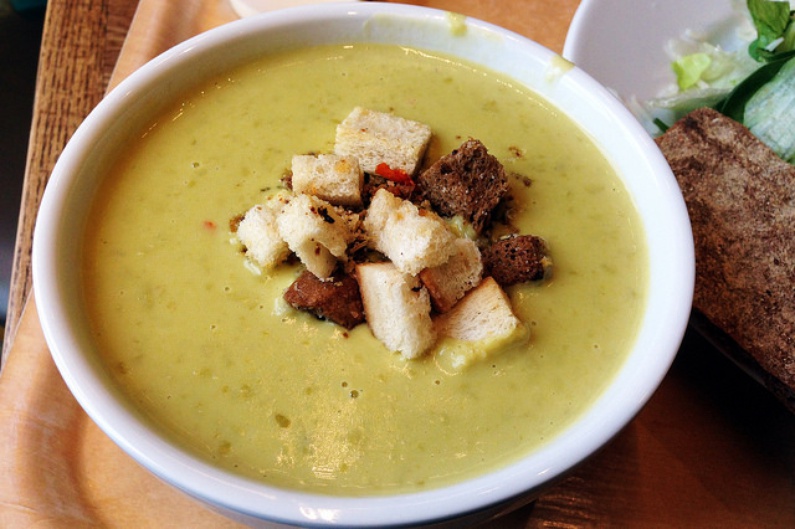 Çorba, or more precisely, mercimek çorbası (lentil soup), has a special place in my heart - and a special place in Turkish cuisine. Meals usually start with a bowl of çorba. Lentil soup may include vegetables such as carrots, potatoes, parsley, tomato and onion and will always be served with lemon.
Çorba, or more precisely, mercimek çorbası (lentil soup), has a special place in my heart - and a special place in Turkish cuisine. Meals usually start with a bowl of çorba. Lentil soup may include vegetables such as carrots, potatoes, parsley, tomato and onion and will always be served with lemon.
Safe morning bet: Turkish breakfast!
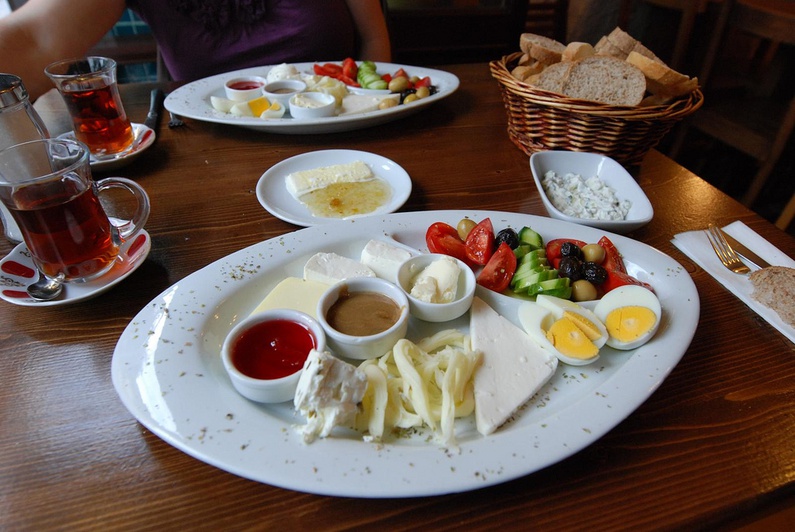 But my all-time favorite Turkish meal would be breakfast. Turkish breakfast (kahvaltı) is an epic, big meal that is meant to be enjoyed over several hours and with multiple refills of tea. Breakfast is served all day long, up until 5 pm. Usually, I order one portion for two people, since one serving is more than enough. Mountains of fresh bread is essential, as is cheese (there a number of varieties), cucumber, tomatoes, olives, butter, and jam. If you are going to a more fancy place, there will be extras included such as kaymak (clotted cream) with honey, acuka (spicy tomato dip), boiled eggs, menemen and börek. Sometimes breakfasts come with a few meat items such as sausages. These are easily left aside, but to be sure ask for everything “etsiz”.
But my all-time favorite Turkish meal would be breakfast. Turkish breakfast (kahvaltı) is an epic, big meal that is meant to be enjoyed over several hours and with multiple refills of tea. Breakfast is served all day long, up until 5 pm. Usually, I order one portion for two people, since one serving is more than enough. Mountains of fresh bread is essential, as is cheese (there a number of varieties), cucumber, tomatoes, olives, butter, and jam. If you are going to a more fancy place, there will be extras included such as kaymak (clotted cream) with honey, acuka (spicy tomato dip), boiled eggs, menemen and börek. Sometimes breakfasts come with a few meat items such as sausages. These are easily left aside, but to be sure ask for everything “etsiz”.
Afiyet olsun! (Enjoy your meal!)



